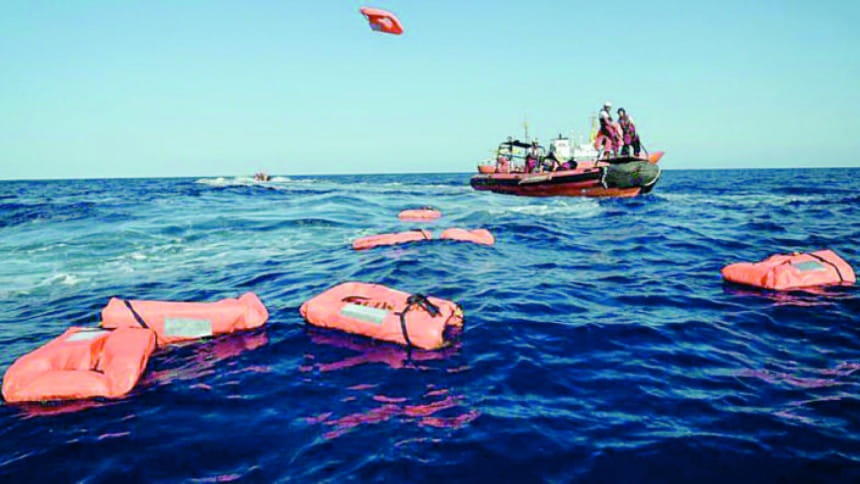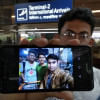Stuck inside the boat hull, they suffocated

"We could hear them struggling to breathe and dying slowly and there was nothing we could do," said 45-year-old Gurudas Mondol, who had survived the horrifying boat accident in the Mediterranean Sea on February 14.
He was describing how eight of his companions died aboard the tiny boat.
Their bodies reached Dhaka yesterday.
"Fifty-three of us were made to board the tiny boat barely 10 feet in length. To fit everybody in, they made us climb inside the hull where the fuel was stored," said Gurudas.
The eight deceased Bangladeshis were among those inside the hull.
A few miles into sea en route to Italy, the boat started taking in water. "The ones inside the hull started yelling and banging the deck from below, but there was no space for even one more person on the deck. We were sitting on top of each other. Slowly the noise stopped. I could do nothing but sit and listen to them die," he said.
Nineteen-year-old Badhan Mandol was inside the hull when the water started seeping in.
"There was a small access hole. I don't know how I managed to climb out. Another migrant let me sit on his lap," he said, adding, "The others suffocated to death as fuel started leaking below."
While the boat chugged on, with its engine failing at times, they were intercepted by the Tunisian coast guards.
"Initially the coast guards wanted our fuel, but we had only two canisters left. I had myself thrown out a few canisters to lighten the load of the boat," said Gurudas. "They boarded the boat and opened the access hatch to search for fuel and found bodies instead. They pulled out two people, both Bangladeshis. One of them, Manotosh Sarkar, was alive. His lips were moving and he had a pulse."
The coast guards evacuated Manotosh of Rajoir upazila in Madaripur and he is still receiving treatment in Tunisia, said Badhan.
A plane carrying the eight bodies landed in Dhaka at 12:30pm.
The bodies were of Mamun Sheikh, Sajal Bairagi, Nayan Biswas, Rifat Sheikh, Sajib Kazi, Imrul Kayes Apon, Md Abdur Kaiser, and Rasel Sheikh.
They're all from Madaripur and Gopalganj.
The incident left nine dead, eight Bangladeshis and a Pakistani. The 44 others on the boat were rescued.
Their boat journey was the last leg of an already horrifying ordeal fraught with torture.
Gurudas and Badhan were locked up in a flat in Tripoli for one and half months, where they waited for their "game", a colloquial term for the perilous journey from Libya to Italy.
"On the day the 'game' began, six of us were piled into the boot of a minivan and smuggled to a 'game-ghor' [cell]. They beat us indiscriminately with metal pipes when we protested for being put in the boot," said Gurudas.
He could not say where the "game ghor" was.
The "game ghor" housed 90 migrants, mostly Bangladeshis and some Sudanese.
"They gave us food every other day, sometimes rice and potatoes, sometimes just bread. There was one bathroom for all of us. The water shortage was so acute that we used our gamchha [traditional towel] to collect our sweat and sucked on it," said Gurudas.
Several times a day, the traffickers would beat them up, usually if one asked for food or water.
Gurudas said he had sold off his ancestral land and borrowed from loan sharks to pay Tk 14 lakh ($12,750) for the journey from Bangladesh to Italy.
After seven days in the "game ghor", they were piled onto a pickup truck. "We were made to lie down … stacked like fish in two layers. They then covered the flatbed with tarpaulin."
Gurudas said deceased Mamun Sheikh had become sick during this leg of the journey. "He was already half-dead when we got off the truck at Zuwara," he said.
That evening, they were kept hidden in a holding place they called "khwabja-ghor". Late at night, they were called out and made to wade into the water where the boat waited. "They made us run and beat us if we did not," said Gurudas.
A few miles into the sea, they were first intercepted by a boat with Libyans. Their boat was reeled in and they were transferred to a detention centre.
The conditions in the detention centre are horrific with the migrants being beaten, forced to live in substandard conditions, and re-trafficked.
"At the detention centre, they were given six litres of water every other day to be used by 30 people," said Badhan. "They made us sit facing the wall and beat our backs with rods."
"I wanted to go home but I was told that I would have to pay Tk 15 lakh more," he added.
After eight days at the detention centre, they were re-trafficked by the prison guards.
Badhan and Gurudas identified them as members of law enforcement as they carried guns.
"The guards of the detention centre called us out one night and made us get into a vehicle. We changed vehicles a few times and came back to the same 'game ghor'," said Gurudas. They were transported to a holding cell near the coast the same day and made to board the 10-foot boat.
It was this boat journey that ended in the deaths of eight Bangladeshis.
A case was filed with the Airport Police Station on April 19 by Sunil Bairagi, father of deceased Sajal Bairagi.
The charges include murder (Section 302/34) and violations of the Human Trafficking Prevention Act.
Juboraj Kazi, 24, of Madaripur, and his father Mosharraf Kazi, who lives in Libya, have been accused in the case.
Juboraj has been arrested.
As news spread of the bodies having landed, a shadow of grief descended across homes in Rajoir upazila.
Sajal's mother was sitting against a pile of hay and staring into nothingness.
Mamun's mother collapsed on her doorstep, bawling uncontrollably, while his friends picked up shovels to dig a grave.
Nayon's mother crept into a dark corner of a room in her home and wept silently.
Astonishingly, neighbours gathered outside were talking about hopes of making it to Italy.
"My son will go next after Eid. I hope he does not die like Mamun," said a mother as she watched Mamun's mother grieve.

 For all latest news, follow The Daily Star's Google News channel.
For all latest news, follow The Daily Star's Google News channel. 





Comments